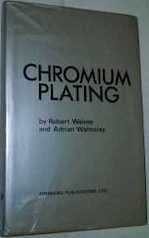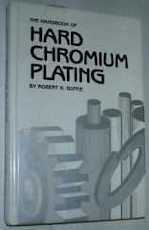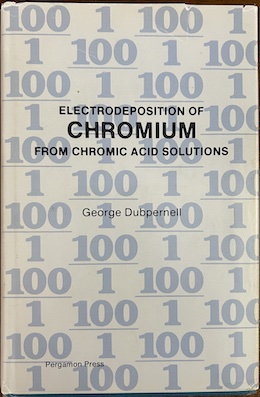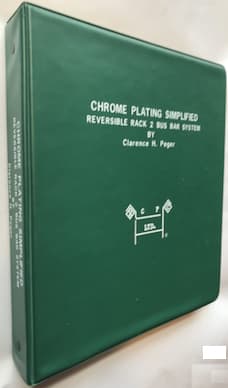
-----
Trivalent Chrome Plating Q&A's, Problems & Solutions
Q. Hi all
We are using Decorative trivalent chrome plating. We are facing issue of white patches after chrome plating once parts are put in water rinse. White patches are superficial layer which can be wiped off easily
We have changed rinse water tanks also, but no improvement
Regards
- Ponda Goa, India
January 13, 2021
A. SANTOSH,
DO YOU HAVE WHITE PATCHES AFTER TRIVALENT CHROME AND WIPE OFF, NO PLATING PROBLEM YOU HAVE PROBLEM IN YOUR RINSE TANK.
CLEAN & WIPE WALL OF RINSE TANK.

Popatbhai B. Patel
electroplating consultant - Roseville, Michigan
![]() Thank You Sir,
Thank You Sir,
The problem has been resolved. The issue was not only with the rinse tanks, some other factors were also involved.
- Ponda Goa
? Myself, and Popat and the other readers are happy to hear that your problem has been resolved! However, this is a Mutual help forum, not a help Santosh forum :-)
If "some other factors" were involved, we readers would all appreciate if you would take the time to tell us what those other factors were. Thanks!
Luck & Regards,

Ted Mooney, P.E. RET
Striving to live Aloha
finishing.com - Pine Beach, New Jersey
Ted can be retained for immediate
answers or long term project help
⇩ Related postings, oldest first ⇩
Q. I would like to know the basics about trivalent chromium plating as replacement for hex chrome, where can I get technical info and who's chemistry is considered to be the best, is the equipment somewhat different, do I need ion exchange, costs, advantages, disadvantages, etc.
I've heard some horror stories about premature corrosion and flaking of deposit and would really like to skip non reliable processes.
Regards
Juan Fuentesplating shop - Lerma, Edo Mex, Mexico
2004
for Shops, Specifiers, & Engineers

by Weiner & Walmsley (1980)
avail from eBay, AbeBooks, or Amazon

by Robert K. Guffie (1986)
avail from AbeBooks, or Amazon

avail from eBay, AbeBooks, or Amazon
"Hard chromium plating: A Handbook of Modern Practice"
by John David Greenwood (1971)
avail from eBay

very rarely avail from Amazon
but copies are available in a few libraries)
"A Chromium Plating Bath With The Fluoride Ion"
by Alfred Perlenfein (2013)
avail from eBay, AbeBooks
(as an Amazon Associate & eBay Partner, we earn from qualifying purchases)
A. Hi Juan.
All of the major suppliers offer trivalent chromium plating including Atotech and Macdermid and we can't publicly debate which proprietary process is best (huh? why?). But Chevy Truck vs. Ford Truck, Mac vs. PC, iPhone vs. Android style debates usually get silly quickly.
Many plating shop managers believe that the supplier's chemistry is not nearly as important when making a choice between proprietaries as the expertise & dedication of the supplier's local tech service person, and my observation has been that they often switch suppliers when that serviceperson switches employers :-)
Luck & Regards,

Ted Mooney, P.E.
Striving to live Aloha
finishing.com - Pine Beach, New Jersey
Ted can be retained for immediate
answers or long term project help
A. Trivalent chrome is susceptible to salt attack.
We use trivalent for our decorative chrome and it bears up well with plenty if nickel underneath it. But we won't do marine pieces and have seen many failures where trivalent has been exposed to north eastern road salts.
Trivalent will not tolerate the wear of hex chrome either.
So it's horses for courses.
If your work pieces are decorative, trivalent is fine. If it is subject to salts or wear, use hex.
Steve Clarkpolishing shop - Belfast, Maine
|
A. Trivalent chromium is good as a decorative finish but not very good as an engineering coating. It is slightly darker and grayer than hexavalent chromium and its colour is more varied. This can present problems when trying to assemble multiple parts into one assembly. The technology for trivalent plating is continuously advancing, so it would be best to talk to reputable suppliers about what you need and what they can supply. When it first became available it was quite difficult to use and at least one process required a divided cell with a membrane separating the anode and cathode to prevent the anode oxidising the Cr(III) to Cr(VI). However, things have improved since then! As far as I am aware, there is no barrel plating trivalent system commercially available, but if a supplier has now got a reliable one, no doubt I will be corrected. At the end of the day, you have to decide what you what and whether a supplier can meet your needs - its all "horses for courses".  Trevor Crichton R&D practical scientist Chesham, Bucks, UK A. We have been using trivalent chrome to plate Class 8 truck bumpers and grille surrounds for approximately 10 years. We have never had any problems with chipping or any particular abrasion problems. The classic problems you might experience with trivalent chrome as opposed to hex is that trivalent typically has a different color compared to hex and it is more susceptible to metallic contamination. Depending on your rinsing, metallic contamination can be considerable. Speaking from personal experience, nickel and iron contamination can be very detrimental and cause big problems with color. Most suppliers recommend a small ion exchange system to remove metallics. If you have superior rinsing, it may not be required. Trivalent tends to scratch and abrade more easily than hex so care must be taken in not being too aggressive when cleaning the finished parts. Some people will use abrasive waxes on hex chrome or even chrome buff. You should avoid the use of them when plating with Tri. Conversely, trivalent doesn't have the problems of burning, whitewash and toxicity problems that hex has. You don't have to worry about a Chromic Acid/Sulfuric Acid ratio. The chemical constituents are much more expensive with tri than hex. But, the overall reduction in wastewater costs, regulatory compliance and health and safety cost avoidance may help make up the difference. Hope this helps!  Daryl Spindler, CEF decorative nickel-chrome plating - Greenbrier, Tennessee |
Black Hex Chrome vs Black Tri Chrome
Q. Will the physical appearance of the two look different? We received our first shipment of TriChrome plated steel plates and the black is faint around the edges. The hex always had a consistent dark appearance.
Joel Alexander- Cleveland, Ohio
2006
? Just to clarify before we get lost in the woods: You are talking about black chromium plating, not zinc plated parts with a chromate conversion coating, Joel?

Ted Mooney, P.E.
Striving to live Aloha
finishing.com - Pine Beach, New Jersey
Ted can be retained for immediate
answers or long term project help
Multiple threads merged: please forgive chronology errors and repetition 🙂
Q. My question is: if we start with trivalent chromium for our chrome plating operation, how do we prevent the trivalent species from oxidizing to Cr+6? Thank you
Jeff Moraitis- Van Buren Twp., Michigan
2006
A. To my knowledge there are no generic trivalent chromium plating processes, only proprietary ones. My understanding is that one type uses semi-permeable membranes around the anode compartment that do not let the hexavalent ions reach the work. Another type uses anodes of a special material that supposedly prevents the formation of hexavalent ions.
I can't be of much help except to say that I think you need to learn from the supplier, depending on which type of system you are using, what protocol to use to deal with formation of hexavalent chromium.

Ted Mooney, P.E.
Striving to live Aloha
finishing.com - Pine Beach, New Jersey
Ted can be retained for immediate
answers or long term project help
A. The simplest way of stopping Cr(III) being oxidised to Cr(VI) is to use a divided cell, so the chromium ions don't get the chance to see the anode.

Trevor Crichton
R&D practical scientist
Chesham, Bucks, UK
Q. I have a question for Trevor. What do you mean by a divided cell? Is the anode behind a wall but still sharing the same solution. Can CR VI in a CR III bath cause faint black Staining?
Kelly Pichel- Aguanga, California, USA
2006
A. A divided cell is one where two electrolytes are kept apart by a membrane or sintered barrier. The electric current can pass across the barrier, but large metal ions cannot. I have successfully used a porous clay flowerpot as a cell divide; one electrode (anode) was inside the pot with an electrolyte (10% sulfuric caid) and the other electrode (cathode) was outside the pot in another container. The workpiece was in the outer container and an electric current was passed between the two electrodes. The voltage drop was higher than one would normally expect when plating, but the process worked and I didn't get Cr(III) oxidising to Cr(VI).
As far as the other question is concerned, trivalent chromium is very susceptible to contamination of any type, so Cr (VI) could well cause these problems. However, faults with trivalent chromium are also dependent on the bath makeup, so I would check with your supply house when trying to trace faults.

Trevor Crichton
R&D practical scientist
Chesham, Bucks, UK
A. I can only answer on one of the commercially available TriChrome processes. Hexavalent chromium is a contaminate in trivalent chromium plating and will cause significant problems. Unless your solution is out of balance you should not be forming hexavalent chromium at the anodes.

George Shahin
Atotech - Rock Hill, South Carolina
Timeline of Change from Hexavalent to Trivalent Chrome
⇦ Tip: Readers want to learn from your situation;
so some readers skip abstract questions.
Q. Can someone tell me when did the change from Hexavalent to Trivalent chrome happen in the US.
Did automotive / truck industry use hexavalent chrome for exhaust stack prior to 2000.
Which year did majority of the exhaust chrome plating suppliers switch to Trivalent from Hexavalent. Is there a US govt. mandated date like EPA 2010 emissions timeline.
Thank you in advance for the response.
Customer - Madison, Wisconsin, USA
September 16, 2008
A. Hi, Deepak. There are no U.S. federal laws governing this, although there might be local restrictions in areas like San Francisco Bay.
European RoHS, WEE and other standards drove a transition from hexavalent to trivalent chromate conversion coatings on parts plated with zinc and zinc alloy. This has to do with the unacceptability of leaving hexavalent chromate conversion coatings on the surface of parts. But it does not dictate whether hexavalent or trivalent processes be used for the process as long as there is no hexavalent chromate on the parts.
Chrome plating baths are different than chromate conversion coating baths; they deposit metallic chrome onto articles and leave neither trivalent nor hexavalent chrome on the parts. So the question of hex vs. tri has little to do with chrome plated parts, only with chromate conversion coatings.
To my knowledge, most automotive chrome plating specs still require hexavalent chrome plating. Good luck!
Regards,

Ted Mooney, P.E.
Striving to live Aloha
finishing.com - Pine Beach, New Jersey
Ted can be retained for immediate
answers or long term project help
Q. Dear all:
Trivalent chromium plating gets darker coating compared with hex. Is there any commercial product to make the color as white as the hex?
student - China
March 26, 2011
A. Hi, YF.
Asif Nurie makes the point in thread 34810 that we really shouldn't judge today's best trivalent chrome plating processes by the weaknesses of the processes of 25 years ago. Perhaps you should contact a few suppliers for their take on whether whiter trivalent chromium plating is available today. Good luck.
Regards,

Ted Mooney, P.E.
Striving to live Aloha
finishing.com - Pine Beach, New Jersey
Ted can be retained for immediate
answers or long term project help
Q. What is the finish difference in Hex. Chrome plating & Tri-chrome plating on @ 15 microns of nickel (single layer) as an undercoat on finely finished mild steel parts? Is the trivalent colour exactly same as Hex. Chrome ( Bluish finish?) .
What is the CASS or Salt spray that we can achieve on Tri-chrome and compared with Hex chrome?
Which chemistry -- Sulphate bath or Mixed Bath performs better in terms of Neutral salt spray or CASS Test (without sealant, considering both plated on same type of Mild steel components with single layer nickel)?
- Vadodara, Gujarat, India
June 17, 2013
Passivation of dark trivalent chromium plating
Q. We are plating dark trivalent chromium on to both satin and bright nickel. We are having an issue where, some weeks after plating, the surface begins to change colour and look "aged" (for want of a better word).
There has been some discussion among management in our company (plating is not our primary activity, but we have a captive shop), but without any real plating experience among most of the management team, it has been inconclusive.
Unfortunately, even different people from our supplier seem to be giving us different information, so I thought I'd try getting some feedback from here:
Should we be using a passivate after dark trivalent chromium plating, and what effects are we likely to notice. Will it change the colour of the deposit, or will it prevent it from changing after plating?
Plating shop supervisor` - Brisbane, Qld, Australia
February 9, 2017
A. It is always advisable to use passivate after Trichrome process. They help both in discoloration (aging as per what you said), as well as CASS performance is increased substantially.
Mayank Ahuja- -Gurgaon, Haryana, India
June 26, 2018
? Hi Mayank. What is the general nature of this 'passivate' process please? Is it an acid to remove some undesired component from the surface as is done in the passivation of stainless steel, or is it a chrome-based or non-chrome conversion coating such as is used in the passivation of zinc plating, or is it actually an additional silicate or zirconium or other coating on top of the nickel-chrome plating? Thanks.
Regards,

Ted Mooney, P.E. RET
Striving to live Aloha
finishing.com - Pine Beach, New Jersey
Ted can be retained for immediate
answers or long term project help
A. It is an electro-chromate with a small amount of hexavalent chromium which accelerates the aging of the chromium deposit by increasing the amount of chromium oxide on the surface.
This is an electrodeposition in which Tin/lead (4-7%) anodes are used with 0.5 A/dm2 current for typically a minute.
- Gurgaon, Haryana, India.
![]() Thanks, Mayank!
Thanks, Mayank!
Regards,

Ted Mooney, P.E. RET
Striving to live Aloha
finishing.com - Pine Beach, New Jersey
Ted can be retained for immediate
answers or long term project help
Q. Hi Mayank,
When you say use of Post dip after Trichrome plating has small amount of Hex Cr, Is the concern of replacing Hex Cr to Tri Cr achieved?
Regards,
Shivakumar.
G&W - Mumbai, Maharashtra, India
March 18, 2020
A. Hi Shivakumar. We'll try to advise Mayank of your question, although his posting is from almost 2 years ago, so the contact info we have may not work.
But I think you need to be very explicit re. exactly what do you mean by "Is the concern of replacing Hex Cr to Tri Cr achieved?". Are you asking whether the process generates RoHS compliant parts, or whether the process is safer for workers than hex chrome plating, or whether it complies with some local ordinance in Mumbai, etc.?
The general question of whether it produces RoHS acceptable parts greatly interests me! I know chrome plated parts are RoHS-compatible whether plated in hex or tri baths because they both produce metallic chrome, not hex or tri chrome; whereas hex-based conversion coating chemistry generates non-RoHS parts. Indeed it's not clear to me either whether what Mayank described leaves hex chrome on the parts :-)
Regards,

Ted Mooney, P.E. RET
Striving to live Aloha
finishing.com - Pine Beach, New Jersey
Ted can be retained for immediate
answers or long term project help
A. Hi Ted long time. I received your email. It's good using forum as Q&A. Yes it defies the purpose of being 100 % hex chrome free, and yes hex chrome is electro deposited on top of trichrome deposition. But with hex chrome nature as excellent rudimentary passivate (can be used as passivate over copper, giving gloss to brass and silver). We don't have any useful chemistry yet to take over amazing properties of hex chrome completely. But it's only 2-3% w/v of hex chrome used in this bath, which is 100X drop to our conventional system. On top of it if we use hex chrome and trichrome regularly for next 20 years even the so called high cost (bath maintenance and additions) of trichrome is at par with hex chrome bath. So it does solve the purpose to very great extent.
Hope I was not off point.
Freelancer - Ghaziabad, UP, India.
Q, A, or Comment on THIS thread -or- Start a NEW Thread
